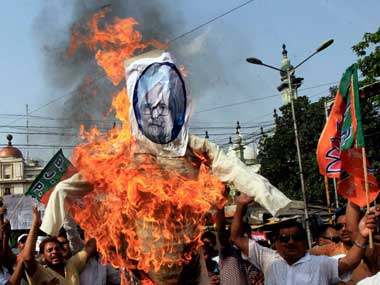Bharat Bandhs - of the sorts we’ll witness today - make for great visual drama. Given the myriad forms of protest demonstrations that Indians are given to - hoisting autorickshaws onto bullock carts, manually hauling heavy-duty automobiles, and, of course, that eternal favourite (burning effigies of leaders) - our television screens will today be filled with high-action images and thunderous speeches.
Countless such protest demonstrations and marches have been planned for today, as part of the Bharat Bandh called by the BJP and the Left parties to channel popular anger against the recent petrol price hike.
BJP leader Prakash Javdekar has promised a “total shutdown across the country”, since this will be the “biggest democratic protest” the country has seen in a long time.
[caption id=“attachment_326729” align=“alignright” width=“380” caption=“An incendiary protest against petrol price hike. PTI”]  [/caption]
“Party leaders, including MPs will take part in rallies and hold public meetings to protest the steep hike in prices of essential commodities by the UPA Government,” party vice-president Mukhtar Abbas Naqvi said.
BJP president Nitin Gadkari invited even UPA allies - like the DMK and the Trinamool Congress - which have opposed the petrol price hike to join the bandh.
Protest demonstrations of this sort are of course one way of channelling popular anger, and in some ways are an intrinsic characteristic of democracy.
Yet, it’s worth pondering whether a day-long shutdown of normal life - with all the losses it will entail for businesses and the economy and the inconveniences it will inflict on ordinary folks - is the best way to give voice to people’s anxieties.
Although the BJP has said that the bandh will be “peaceful” and public transport services will not be disrupted and people’s lives will not be inconvenienced, the “success” of the bandh will be measured by the extent of loss that businesses suffer. In July 2010, a similar Bharat Bandh called by Opposition parties to protest against fuel price hikes had, in the estimation of the chambers of industry, entailed a production loss of about Rs 13,000 crore. Today, it could be much higher.
Just how it will help common folks to have a Rs 13,000 crore bill sent to them (since in the end, it is they who pay in the form of higher taxes and inflation) isn’t clear.
But there’s another point that political parties - in this case, the BJP and the Left parties - must ponder over while organising such Bharat Bandhs: the illusory political rewards it yields them.
As this blogger pointed out in 2010,“The problem with a Bharat Bandh is that it is an untargetedcampaign with highly suspect electoral returns… With BJP-ruled states likely to engineer the disobedience to be a sucess and Congress-ruled states doing the opposite, the pretense on both sides is not even honest.”
But more critically, he argues, the Bharat Bandh is counterproductive to the BJP’s aspirations of an electoral comeback because such a shutdown does little or nothing “to help the BJP break new ground with rural votes” - who are being targeted by the UPA with universal entitlements - and effectively turns off urban voters who are inconvenienced by such shutdowns.
In fact, people working in the unorganised sector will bear a disproportionate share of the burden - if even a day’s wage is lost.
Looking back on that 2010 Bharat Bandh, perhaps the BJP might want to introspect on just what it gained then - and what it can hope to achieve now. Given the party’s inability thus far to harvest popular anger against the UPA government’s many corruption scandals, the political gains from such shutdowns - if there are any at all - may not accrue to it.
Indian democracy has over time matured in many ways. Perhaps political parties - across the spectrum - too must find a way of channelling popular sentiments without causing economic losses and inflicting misery on common folks.


)
)
)
)
)
)
)
)
)



